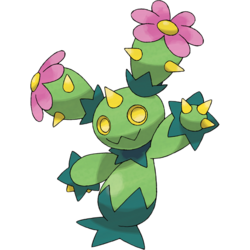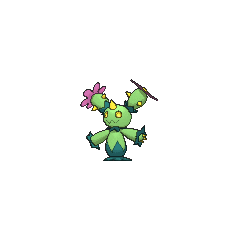From Bulbapedia, the community-driven Pokémon encyclopedia.
Maractus (Japanese: マラカッチ Maracacchi) is a Grass-type Pokémon introduced in Generation V.
It is not known to evolve into or from any other Pokémon.
Biology
Maractus is a cactus-like Pokémon, with large ear-like extensions. These extensions feature dark green spiky arrangements at the base, yellow spikes further up, and flowers, with pink petals and yellow centers, at the top. It has a yellow spike on its head, yellow eyes and a spiky-looking mouth. Other dark green spiky arrangements adorn its neck, the wrists of its yellow-fingered arms, and base. Its base features further such green spikes arranged in a five-pointed star.
When Maractus moves its body rhythmically, it emits sounds reminiscent of maracas being played. This allows Maractus to produce up-tempo songs and dances that it can use to scare away predators. Avian Pokémon in particular may try to feed on its flower seeds.
Maractus live in arid regions and dry desert-like areas.
In the anime
Major appearances
Three Maractus appeared in A Maractus Musical! under the ownership of Toby. They performed in a Pokémon Musical and battled Ash's Pikachu, Tepig and Snivy in a Triple Battle.
A Maractus appeared in Team Plasma's Pokémon Power Plot!.
Minor appearances
A Maractus made a cameo appearance in Climbing the Tower of Success!.
A Maractus appeared in a fantasy in Clash of the Connoisseurs!.
A Maractus appeared in Team Plasma's Pokémon Manipulation!.
A Trainer's Maractus appeared in Cilan and the Case of the Purrloin Witness!.
Pokédex entries
| Episode
|
Pokémon
|
Source
|
Entry
|
| BW053
|
Maractus
|
Ash's Pokédex
|
Maractus, the Cactus Pokémon. When Maractus dance in rhythm, they sound like maracas shaking. They make their homes in dry desert-like areas.
|
|
In the manga
In the Pokémon Adventures manga
A Maractus was used by a Team Plasma Grunt in Sandstorm. It, together with its Trainer, were easily defeated by Grimsley and his Bisharp.
In the TCG
- Main article: Maractus (TCG)
Game data
Pokédex entries
| This Pokémon was unavailable prior to Generation V.
|
| Generation V
|
|
| Black
|
It uses an up-tempo song and dance to drive away the bird Pokémon that prey on its flower seeds.
|
| White
|
Arid regions are their habitat. They move rhythmically, making a sound similar to maracas.
|
| Black 2
|
When it moves rhythmically, it makes a sound similar to maracas, making the surprised Pokémon flee.
|
| White 2
|
|
|
| Generation VI
|
|
| X
|
It uses an up-tempo song and dance to drive away the bird Pokémon that prey on its flower seeds.
|
| Y
|
Arid regions are their habitat. They move rhythmically, making a sound similar to maracas.
|
| Omega Ruby
|
It uses an up-tempo song and dance to drive away the bird Pokémon that prey on its flower seeds.
|
| Alpha Sapphire
|
Arid regions are their habitat. They move rhythmically, making a sound similar to maracas.
|
|
|
Game locations
| This Pokémon was unavailable prior to Generation V.
|
|
|
|
|
|
|
In side games
| This Pokémon was unavailable prior to Generation V.
|
|
|
|
|
Held items
Stats
Base stats
| Stat
|
Range
|
| At Lv. 50
|
At Lv. 100
|
75
|
|
135 - 182
|
260 - 354
|
86
|
|
81 - 151
|
159 - 298
|
67
|
|
64 - 130
|
125 - 256
|
106
|
|
99 - 173
|
195 - 342
|
67
|
|
64 - 130
|
125 - 256
|
60
|
|
58 - 123
|
112 - 240
|
Total: 461
|
Other Pokémon with this total
|
- Minimum stats are calculated with 0 EVs, IVs of 0, and (if applicable) a hindering nature.
- Maximum stats are calculated with 252 EVs, IVs of 31, and (if applicable) a helpful nature.
|
Type effectiveness
| Under normal battle conditions in Generation IX, this Pokémon is:
|
|
|
|
|
|
|
|
|
|
|
|
|
Learnset
|
|
|
|
- Bold indicates a move that gets STAB when used by Maractus
- Italic indicates a move that gets STAB only when used by an Evolution of Maractus
- Click on the generation numbers at the top to see level-up moves from other generations
|
|
|
|
|
- Bold indicates a move that gets STAB when used by Maractus
- Italic indicates a move that gets STAB only when used by an Evolution of Maractus
- Click on the generation numbers at the top to see TM moves from other generations
|
|
|
|
|
- Moves marked with an asterisk (*) must be chain bred onto Maractus in Generation VII
- Moves marked with a double dagger (‡) can only be bred from a Pokémon who learned the move in an earlier generation.
- Moves marked with a superscript game abbreviation can only be bred onto Maractus in that game.
- Bold indicates a move that gets STAB when used by Maractus
- Italic indicates a move that gets STAB only when used by an Evolution of Maractus
- Click on the generation numbers at the top to see Egg moves from other generations
|
|
|
|
|
- A black or white abbreviation in a colored box indicates that Maractus can be tutored the move in that game
- A colored abbreviation in a white box indicates that Maractus cannot be tutored the move in that game
- Bold indicates a move that gets STAB when used by Maractus
- Italic indicates a move that gets STAB only when used by an Evolution of Maractus
- Click on the generation numbers at the top to see Move Tutor moves from other generations
|
Side game data
Evolution
Sprites
| This Pokémon was unavailable prior to Generation V.
|
|
|
|
|
Trivia
- Maractus is the only Pokémon with a base stat total of 461.
- Maractus shares its category with Cacnea. They are both known as the Cactus Pokémon.
- Two of Maractus's Abilities revolve around how a real-world cactus stores water with great efficiency: Water Absorb absorbs direct damage to restore health from them as well as making it immune to them, while Storm Drain draws in Water-type moves directed at another target, also making it immune.
- Although Maractus can only be found at the Desert Resort in Generation V where a permanent sandstorm rages, it cannot have any Ability negating sandstorm damage, nor is it Rock-, Ground-, or Steel-type, and thus it is susceptible to damage by the sandstorm.
Origin
Maractus appears to be based on a flowering cactus, most likely the prickly pear, and a maraca. Its behavior may also be inspired by rattlesnakes. It also physically resembles a rabbit and may be a visual pun on the bunny ears cactus. It also seems to be based on traditional Mexican dress styles and, due to the fact that it dances and makes maraca-like sounds, may be based on Spanish dances, possibly the Mexican version of the Cuban Son.
Name origin
Maractus may be a combination of maraca and cactus.
Maracacchi may be a combination of maraca, cactus and mariachi.
In other languages
|
|
| More languages
|
 Russian Russian
|
Марактус Maraktus
|
Transcription of English name
|
|
|
|
External links

|
This Pokémon article is part of Project Pokédex, a Bulbapedia project that aims to write comprehensive articles on each Pokémon species, as well as Pokémon groups and forms.
|


 For other sprites and images, please see Maractus images on the Bulbagarden Archives.
For other sprites and images, please see Maractus images on the Bulbagarden Archives.




















































